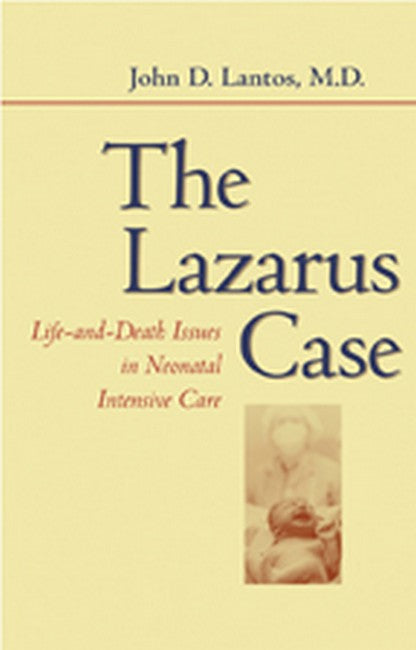In this new, startlingly original book, John D. Lantos weaves a compelling story that captures the dilemmas of modern medical practice. The Lazarus Case: Life-and-Death Issues in Neonatal Intensive Care begins with a fictional malpractice casean amalgam of typical cases in which Lantos appeared as an expert witnessand uses it as the framework for addressing the ethical issues surrounding neonatal intensive care. Lantos draws on his experience in neonatal medicine, pediatrics, and medical ethics to explore multiple ethical dilemmas through one poignant representative situation. In Lantos's model case, a doctor decides to stop resuscitation of a premature infant, a tiny ''preemie'' who seems past reasonable care. The baby survives with severe neurological defects and the parents sue the doctor, alleging that stopping treatment was negligent. From this case, Lantos considers our moral obligations to critically ill babies, the meaning of negligence, and the sorts of social structures that shape the moral consciences of doctors. Each chapter begins with Lantos deposing in the conference room of the plaintiffs' lawyers. The questions put to Lantos throughout the deposition spark an engrossing retelling of his personal experiences with premature babies, as well as his thoughtful discussions of ethics, morality, history, and medical statistics. Sprinkled throughout the book are references to fictional works by Camus, Dostoevsky, Shakespeare, Twain, and others. Lantos uses these literary examples to further illustrate the ambiguities, misunderstandings, responsibilities, and evasions that plague our decisions regarding life and death, medical care and medical education, and ultimately the cost and value of preserving the lives of the most vulnerable among us.''Lantos's insights are thoughtful, his empirical and sociological research is impeccable. His insistence that moral agency is possible despite the fact that society heavily shapes our practices and ways of thinking is ultimately as refreshing as it is convincing. I know of no other book like this one.''Hilde L. Nelson, Department of Philosophy, Michigan State University''This book is a good read for anyone working in modern health care and involved or interested in any way with the difficult and frustratingly ambiguous decisions that must be made daily while caring for the critically ill.''Jonathan M. Whitfield, M.D., Baylor University Medical Center Proceedings''This is an exceptionally good book that makes effective use of an engaging format to discuss the complex social and moral problems engendered by medical technologyin this case, those of treating premature newborns. Each chapter reflects on a specific aspect of this issuetechnological, medical, legal, professional, and ethicaland Lantos brilliantly weaves these themes together by making himself the protagonist in a malpractice case inspired by his own experiences as an expert medical witness.''Stuart J. Youngner, Director, Center for Biomedical Ethics at Case Western Reserve University''This outstanding book is one of the most important on medical ethics in the past ten years . . . It is authored by a physician who views issues of the day firsthand in a thoughtful, realistic, and consistent style. The result is elegant and highly readable. Lantos examines ethical problems of neonatal intensive care through his depositional testimony regarding a child who unaccountably survived after treatment was stopped; the result was severe neurological deficit. This device allows Lantos to make cogent but never doctrinaire comments on our judicial system and the progress of technology at the expense of humanity . . . A must read for physicians, health authorities, and all who in desiring justice imbued with moral acceptance recognize that medical certitude is beyond our powers.''Choice''Lantos presents an eye-opening and thought-provoking discussion in a unique style . . . Lantos is honest and voices some of the questions that many, if not all, physicians and medical ethicists have probably thought about . . . A must-read for all physicians, [and] especially important for those interested in pediatrics, neonatology, geriatrics, or any aspect of medicine that involves lifevs.death decisions.''New Physician''The Lazarus Case is recommended for anyone who is involved in patient care and clinical decision making, and will be an effective resource for teaching bioethics to undergraduate, nursing, and medical students.''National Catholic Bioethics Quarterly''The very readable text offers a compelling perspective, both personal and professional, on a tragic situation that illuminates how difficult it is to determine whether any treatment decision is right or wrong, despite the law's best efforts to render such verdicts.''Felicia G. Cohn, Religious Studies Review''Compelling. Lantos's narrative style makes for pleasurable reading; once you start a given chapter it is difficult to put his book down. He is at his best when sharing his personal experiences in the clinical realm and insights from relevant nonmedical literature. I am confident it will generate important discussions within our group that will benefit each of us and the infants and families we care for.''Journal of the American Medical Association''Lantos has taken an important practical problem and applied our understanding of moral and ethical theory to the issue of the appropriateness of care. An important message here is that in the context of this particular case, there are no right or wrong answers to questions posed.''New England Journal of Medicine''A literate, thoughtful, and provocative work . . . An excellent way for experts and novices in bioethics, health professionals, and the lay public to be exposed to the complexities of ethical dilemmas in medicine.''Medical Humanities Review''Many books have been written about the ethical dilemmas surrounding premature births, but this title, written in a style that should appeal to general readers, stands out as a solid introduction to these issues. Recommended for public and academic libraries.''Library Journal

